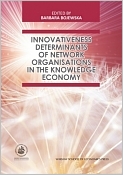INNOVATIVENESS DETERMINANTS OF NETWORK ORGANISATIONS IN THE KNOWLEDGE ECONOMY
Knowledge economy sets new rules for the functioning of the economic entities and the
market. The development of the organisations depends on knowledge management,
organisational learning, creativity, innovativeness and the organisation's ability to
cooperate. Creation of networks, focusing on cooperation and partnership are the main
directi ons of the development of enterprises in the conditions of globalisation,
increasing competition, diversity of organisations and strive to meet the growing
expectations of stakeholders. Development of cooperation and business partnership is a
source of new organisational concepts of organisations that allow one to respond to the
challenges of a changing and increasingly complex environment. It results from the need
for (and expectations of) flexibility and speed of action based on the knowledge and
learning of modern organisations. Innovativeness of different types of network
organisations and innovativeness of enterprises belonging to these networks become signifi
cant. Franchise networks, clusters and virtual organisations are the examples of such
innovative organisational forms.
Due to the scope of the subject, this monograph may be an important material for
researchers from such fields of knowledge as: knowledge economy, innovativeness and
network organisations and especially for entrepreneurs and managers who recognise its
usefulness in an economic practice. It should be emphasised that the studies directly
relating to the network organisations, particularly when one takes into account the
criterion of network's size measured by the number of participants and the criterion of
types of network organisations, are not particularly frequently conducted. This underlines
the importance of the undertaken research subject relating to network organisations and
their innovativeness and importance of this monograph dedicated to innovativeness of
network organisations in the knowledge economy.
INTRODUCTION
Barbara Bojewska
CHAPTER I. DETERMINANTSOF NETWORKORGANISATIONS' DEVELOPMENTIN THE KNOWLEDGE
ECONOMY
1.1. Introduction
1.2. The development of network organisations depending on the characteristics of the
environment
1.3. The importance of management concepts in the development of network organisations in
the knowledge economy
1.4. The importance of projects in the development of network organisations
1.5. Summary
Bibliography
Anna Skowronek-Mielczarek
CHAPTER II. OPPORTUNITIES AND B ARRIERS OF THE FUNCTIONING OF THE NETWORK
ORGANISATIONS IN THE KNOWLEDGE ECONOMY
2.1. Introduction
2.2. Determinants of network organisations' creation
2.3. Barriers in establishing and conducting cooperation within network organisations
2.4. Common actions implemented within network organisations
2.5. Summary
Bibliography
Barbara Bojewska
CHAPTER III. THE IMPORTANCE OF NETWORK ORGANISATIONS AS LEARNING ORGANISATIONS IN
THE KNOWLEDGE ECONOMY
3.1. Introduction
3.2. A ctions of network organisations as knowledge organisations
3.3. Characteristics of network organisations as learning organisations
3.4. Instruments that support the development of network organisations as learning
organisations
3.5. Summary
Bibliography
Agnieszka Sopińska
CHAPTER IV. PHENOMENON AND DETERMINANTS OF KNOWLEDGE MANAGEMENT IN NETWORK
ORGANISATIONS AND THEIR INNOVATIVENESS
4.1. Introduction
4.2. The way of acquiring knowledge in network organisations and its determinants
4.3. The way of using knowledge by network organisations and its determinants
4.4. Characteristics of knowledge exchange process in network organisations and its
determinants
4.4.1. The scope of knowledge exchange in the network
4.4.2. Areas which are affected by the knowledge exchange in the network
4.4.3. The direction of knowledge flow in the network
4.4.4. The level of payment for knowledge exchange in the network organisations
4.4.5. The level of formalisation of knowledge exchange in the network
4.4.6. Decision-maker of knowledge exchange in the network organisations
4.5. Knowledge management strategies used in network organisations and their determinants
4.6. The advancement level of building knowledge management system and its determinants
4.7. Knowledge management compared to the innovativeness of network organisations
4.7.1. The advancement level of building knowledge management system compared to the
innovativeness of network organisation
4.7.2. Knowledge management strategies compared to innovativeness of network organisation
4.8. Summary
Bibliography
Anna Skowronek-Mielczarek
CHAPTER V. THE EFFICIENCY IN NETWORK ORGANISATIONS AND MEASURES OF THEIR
INNOVATIVENESS
5.1. Introduction
5.2. Effectiveness dimensions of network organisations
5.3. Economic and financial effectiveness of network organisations in Polish economic
practice
5.4. O rganisational effectiveness in the processes of network organisation's management
compared to business practice
5.5. Summary
Bibliography
Marta Ziołkowska
CHAPTER VI. INNOVATIVENESS DETERMINANTS OF NETWORK ORGANISATIONS
6.1. Introduction
6.2. Premises for implementing innovation in network organisations
6.3. Innovative activity of network organisations
6.4. Types of innovations in network organisations
6.5. Sources of innovation in network organisations
6.6. Benefits of implementing innovations in network organisations
6.7. Summary
Bibliography
Marta Ziółkowska
CHAPTER VII. INNOVATIVENESS DETERMINANTS OF FRANCHISE ORGANISATIONS
7.1. Introduction
7.2. Premises for implementing innovations in franchise organisations
7.3. Innovative activity of franchise organisations
7.4. Types of innovations in franchise organisations
7.5. Sources of innovation in franchise organisations
7.6. Benefits of implementing innovations in franchise companies
7.7. F actors encouraging and limiting innovative activity of franchise organisations
7.8. Summary
Bibliography
Agata Rundo
CHAPTER VIII. INNOVATIVENESS DETERMINANTS OF VIRTUAL ORGANISATIONS
8.1. Introduction
8.2. Premises for implementing innovations in virtual organisations
8.3. Innovative activity of virtual organisations
8.4. Types of innovations in virtual organisations
8.5. Sources of innovation in virtual organisations
8.6. Benefits of implementing innovations in virtual organisations
8.7. Summary
Bibliography
Anna Dąbrowska
CHAPTER IX. INNOVATIVENESS DETERMINANTS OF CLUSTERS
9.1. Introduction
9.2. Characteristics of clusters as network
9.3. Premises for implementing innovations in clusters
9.4. Innovative activity of clusters
9.5. Types of innovations in clusters
9.6. Sources of innovation in clusters
9.7. Benefits of implementing innovations in clusters
9.8. Summary
Bibliography
APPENDIX NO. 1
APPENDIX NO. 2
LIST OF FIGURES
LIST OF TABLES
297 pages, Paperback


